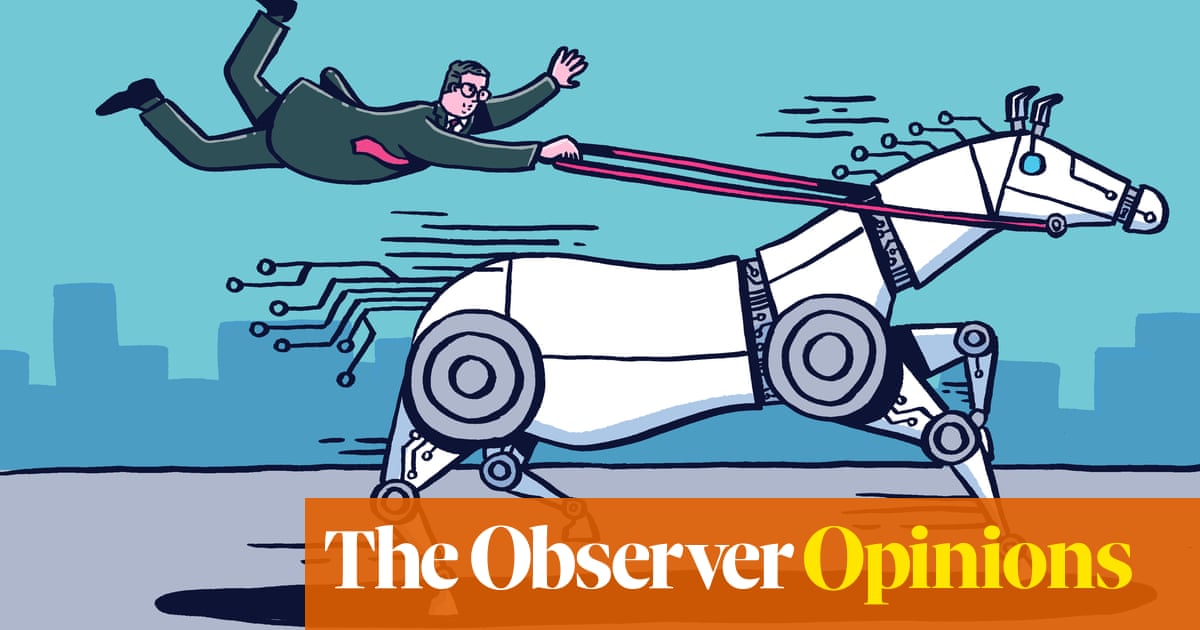Sir Keir Starmer doesn’t do visions. But last Monday he broke the habit of a lifetime in a speech delivered at University College London. It was about AI, which he sees as “the defining opportunity of our generation”. The UK, he declared “is the nation of Babbage, Lovelace and Turing”, not to mention the country “that gave birth to the modern computer and the world wide web. So mark my words – Britain will be one of the great AI superpowers.”
Stirring stuff, eh. Within days of taking office, the PM had invited Matt Clifford, a smart tech bro from central casting, to think about “how we seize the opportunities of AI”. Clifford came up with a 50-point AI Opportunities Action Plan that Starmer accepted in its entirety, saying that he would “put the full weight of the British state” behind it. He also appointed Clifford as his AI Opportunities Adviser to oversee implementation of the plan and report directly to him. It’s only a matter of time before the Sun dubs him “the UK’s AI tsar”.
Clifford’s appointment is both predictable and puzzling. Predictable because he’s been hanging around government for a while: Rishi Sunak reached for him to organise the AI Safety Summit, for example, and to set up the UK’s AI Safety Unit. It’s puzzling because he’s already made a ton of money from tech: his register of outside interests makes for quite a long scroll. Several media and tech executives told the Financial Times of their concern that Clifford – who had set up a successful investment firm with offices around the world – had been given outsized influence over policy in the AI sector.
Clifford is “clearly a hugely capable person”, said Damian Collins, a former Tory technology minister, “but the balance of interests being represented, and how they’re being represented, is a concern”. If Starmer really believes that AI is a transformative technology, then it’s odd that his lead adviser has so much skin in such an important game.
Collins was referring to a particularly hot topic – the routine violation of copyright by tech firms training AI models on other people’s creative work without permission, acknowledgment or payment. The most recent revelation of this practice came from newly unredacted documents in a US court case indicating that the training dataset for Meta’s Llama AI had included a huge database of pirated books scraped from the internet.
Recommendation 24 of the plan calls for reform of the UK text- and data-mining regime. And its assertion that “the current uncertainty around intellectual property (IP) is hindering innovation and undermining our broader ambitions for AI, as well as the growth of our creative industries” has enraged many in those industries. “There is no ‘uncertainty’ in the UK text- and data-mining regime,” says the Creative Rights in AI Coalition. “UK copyright law does not allow text and data mining for commercial purposes without a licence. The only uncertainty is around who has been using the UK’s creative crown jewels as training material without permission and how they got hold of it.”
Much of the Clifford plan looks sensible (though expensive): building a national computing infrastructure for AI, for example; increasing research capacity in universities; training tens of thousands of new AI professionals; fostering public-private partnerships to maximise the UK’s stake in “frontier” AI; and ensuring strong technical and ethical standards to oversee AI development and deployment.
All of this makes a refreshing change from the vacuous bluster about “Global Britain” of the Johnson-Sunak-Truss era. The stated ambition of the plan – to position the UK “to be an AI maker, not an AI taker” – implies a frank acknowledgment that the UK has real potential in this area but is not resourced to realise that potential. Making that happen, though, means that two awkward truths need to be faced.
The first is that this powerful technology is dominated by a few giant corporations, none of which is based in the UK. Their power resides not just in their resources of capital and talent but also in the vast physical infrastructures of datacentres that they own and control. This means nation states that aspire to operate in this space have to get along with them.
after newsletter promotion
In this respect, the British state badly needs to up its game: its current attitude to the companies is the servile cringe displayed by the technology secretary, Peter Kyle, when he said that governments needed to show a “sense of humility” and use “statecraft” when dealing with tech giants rather than using the threat of new laws to influence developments in areas such as frontier artificial intelligence. In other words, the UK should treat these outfits as nation states. Clearly, Kyle hasn’t realised that appeasement is the art of being nice to a crocodile in the hope that he will eat you last.
The other awkward truth is that, although AI is powerful, economists such as Nobel laureate Daron Acemoglu think that its general economic impact will be significantly smaller than tech evangelists believe, at least in the short term. Worse still, as the economist Robert Gordon used to point out, general purpose technologies take a long time to have a significant impact. The message for the prime minister is clear: becoming an “AI superpower” might take a few electoral cycles at least.






:max_bytes(150000):strip_icc()/Dulce-Sloan-011725-e9fe792d63ab405aa4c94ceb81a60047.jpg?w=150&resize=150,150&ssl=1)





